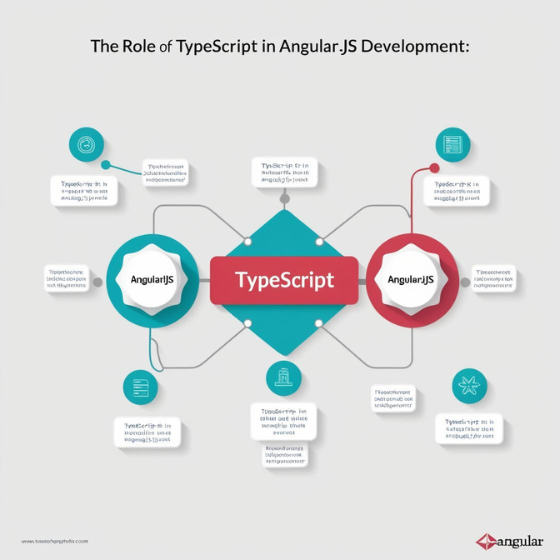The Role of TypeScript in Angular.js Development
Introduction
Did you know that TypeScript has become one of the most popular programming languages for web development, particularly in frameworks like Angular.js? According to a survey by Stack Overflow, 21.2% of developers use TypeScript, with many favoring it for its type safety and robust tooling features. But why has TypeScript gained so much traction in the Angular.js development community?
In this blog, we’ll dive deep into the role of TypeScript in Angular.js development and explore how it enhances the development process. We’ll discuss the key benefits, real-world applications, and how you can leverage TypeScript to build scalable and maintainable Angular.js applications. Whether you’re a developer or a business decision-maker, this blog will provide insights into why TypeScript is the go-to language for Angular.js projects.
Why TypeScript for Angular.js Development?
Angular.js is a powerful framework, but as applications grow in complexity, the need for a more structured and efficient development environment becomes apparent. TypeScript, a statically typed superset of JavaScript, offers several advantages that make it an ideal companion for Angular.js development.
Key Benefits of TypeScript in Angular.js:
- Enhanced Type Safety:
One of the biggest challenges in JavaScript is its dynamic nature, which can lead to runtime errors that are difficult to debug. TypeScript’s static typing allows developers to catch errors at compile time, ensuring more reliable and bug-free code. - Better Tooling Support:
TypeScript integrates seamlessly with IDEs, offering features like autocompletion, type checking, and code navigation, which speed up the development process and improve code quality. - Improved Maintainability:
TypeScript’s strong typing and object-oriented features make it easier to manage and scale large Angular.js applications. As the application grows, TypeScript helps ensure that the codebase remains clean, structured, and less prone to errors.
By adopting TypeScript, Angular.js developers can streamline their workflows, minimize bugs, and create more robust applications.
1. TypeScript and Angular.js: A Natural Fit
Angular.js is designed to work seamlessly with TypeScript, and this combination provides a powerful environment for building modern, scalable web applications.
Key Features of TypeScript That Enhance Angular.js:
- Type Annotations:
TypeScript’s ability to annotate types helps developers understand the structure and expectations of data within the Angular.js framework. This clarity reduces errors and makes the code easier to maintain. - Interfaces and Classes:
TypeScript’s object-oriented features, such as interfaces and classes, are beneficial when building large Angular.js applications that require structured, reusable code. Interfaces in TypeScript define clear contracts for data, while classes enable developers to create modular and reusable components. - Compatibility with ES6 Features:
TypeScript supports modern ECMAScript features such as async/await, modules, and destructuring. Angular.js leverages many of these features, making TypeScript an ideal choice for Angular.js projects.
Example:
Imagine building a complex Angular.js application that requires multiple services interacting with each other. Using TypeScript, you can define interfaces to ensure that each service follows a consistent structure, preventing potential runtime errors that can arise from inconsistent data handling.
2. How TypeScript Improves Development Speed
While JavaScript allows flexibility, it often comes at the cost of development speed. Developers may spend hours debugging issues that arise from dynamically typed variables. TypeScript, on the other hand, reduces the time spent on debugging by providing early error detection, allowing developers to focus on building features rather than fixing bugs.
Benefits for Angular.js Developers:
- Real-Time Type Checking:
TypeScript helps developers identify issues early by providing real-time type checking. This reduces the chances of errors going unnoticed until the application is running in production. - Autocompletion and Code Navigation:
TypeScript offers enhanced autocompletion and code navigation features, allowing developers to write code faster. With autocompletion, developers can quickly access methods and properties without needing to memorize the codebase. - Refactoring Made Easy:
As Angular.js applications grow, refactoring becomes necessary to maintain code quality. TypeScript makes refactoring easier by providing strong typing, which ensures that the changes do not break existing functionality.
By using TypeScript, developers can significantly improve their productivity while building Angular.js applications.
3. Real-World Applications of TypeScript in Angular.js Projects
To truly understand the value of TypeScript in Angular.js development, let’s explore a few real-world use cases. These examples showcase how TypeScript improves the scalability, maintainability, and efficiency of Angular.js applications.
Case Study 1: E-commerce Platform Development
An e-commerce company used Angular.js and TypeScript to build a high-performance shopping platform. With TypeScript’s type-checking features, the development team was able to build a robust checkout process with complex data handling, ensuring that all transactions were processed correctly. The integration of TypeScript improved the platform’s maintainability and reduced the number of bugs during deployment, resulting in a smoother user experience and higher customer satisfaction.
Case Study 2: Corporate Dashboard Application
A corporate client sought to develop a custom dashboard application using Angular.js. By utilizing TypeScript, the development team was able to create reusable components and services that could scale easily as the client’s needs grew. TypeScript’s clear and explicit data typing ensured that all backend services communicated with the front-end components seamlessly, reducing the potential for runtime errors. The use of TypeScript helped keep the dashboard efficient, even with hundreds of simultaneous users.
These case studies highlight the practical advantages of TypeScript when developing complex Angular.js applications. The framework’s scalability and error handling features make it a strong choice for businesses looking to build enterprise-level solutions.
4. How Sodio Leverages TypeScript in Angular.js Development
At Sodio, we specialize in delivering high-quality Angular.js development services, using TypeScript to enhance our development process. We understand the importance of building scalable, maintainable, and high-performance applications, and TypeScript plays a key role in achieving these goals.
Our team of Angular.js developers uses TypeScript to ensure that your application is:
- Error-Free: TypeScript’s static typing allows us to catch errors early in the development process, ensuring that the final product is reliable and bug-free.
- Scalable: With TypeScript’s object-oriented features and strict type checking, we can build Angular.js applications that grow with your business needs.
- Optimized for Performance: TypeScript’s features, combined with Angular.js’s powerful tooling, help us build fast and efficient applications.
Explore our Angular.js Development Services to learn more about how we can help you create a high-performance Angular.js application using TypeScript.
Conclusion
The role of TypeScript in Angular.js development cannot be overstated. By providing enhanced type safety, better tooling support, and improved maintainability, TypeScript helps Angular.js developers build faster, more scalable applications.
If you’re looking to build robust, enterprise-level applications with Angular.js, TypeScript is an essential tool to have in your toolkit. At Sodio, we specialize in using TypeScript to create high-performance Angular.js applications that meet the unique needs of businesses.
Ready to get started with TypeScript and Angular.js? Contact our team today to discuss how we can help you optimize your web development project.







